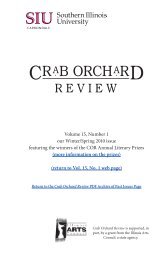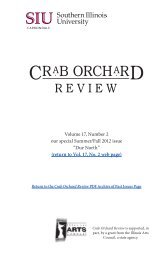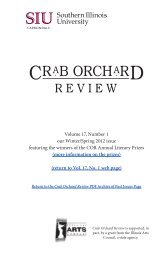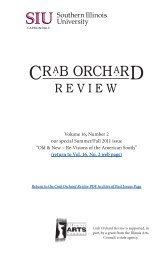Crab Orchard Review Vol. 12, No. 2, our
Crab Orchard Review Vol. 12, No. 2, our
Crab Orchard Review Vol. 12, No. 2, our
Create successful ePaper yourself
Turn your PDF publications into a flip-book with our unique Google optimized e-Paper software.
Daniel C. Bryant<br />
(though I never heard him say it himself), and he recorded as well<br />
how he roller skated, played football, climbed on a railroad trestle,<br />
collected cigar boxes, kept nighttime vigils in his backyard for<br />
lightning bugs and shooting stars, dug trenches and built model tanks<br />
and “aeroplanes” with Dick and Clifford. Occasionally on a Saturday,<br />
he packed a backpack and took the Anderson Ferry across the Ohio to<br />
Kentucky to explore and picnic in the woods.<br />
One experience he noted in particular detail, as if in anticipation<br />
of a career still fifteen years off, was a week he was sick. Spanish flu he<br />
called it. Many people, of c<strong>our</strong>se, had viral influenza at that time—for<br />
six weeks school was closed, public gatherings were restricted, as they<br />
would no doubt be today if the bird flu threat materializes—and from<br />
his symptoms of fever, muscle aches, sore throat and cough, and poor<br />
appetite, I would have to agree with his diagnosis. A bed was made for<br />
him in the front room, he wrote, where he took sweat treatments and<br />
castor oil, Seidlitz Powder, a pink pill and a white pill, magnesia water<br />
and quinine capsules. For his throat pain he gargled and took sprays.<br />
When he had the energy he read his library books, but much of the<br />
time he only napped. The doctor came, nearly every day according to<br />
the entries, to probe and listen and conclude that his young patient<br />
was getting better.<br />
The entry for <strong>No</strong>vember 11 is a long one. It tells, after dutiful<br />
recording of weather and symptoms, how church bells rang out, how<br />
guns were fired in the air, how flags waved as crowds of people passed<br />
up the hill outside his window heading for town. From that day on,<br />
as if it had been the virus in a front room in Cincinnati, Ohio, rather<br />
than the Germans in a railroad car in Compiègne, France, that had<br />
surrendered, he began to get better, just as the doctor said he would,<br />
and within a week was back in school, back on the trestle with Dick<br />
and Clifford and the rest of the gang.<br />
In college, before I ever thought of emulating my father and going<br />
into medicine myself, and for no good reason I can remember now,<br />
I majored in French. To improve my speaking and sense of Gallic<br />
culture, I thought it would be beneficial to spend a summer there.<br />
My parents, cautious and patriotic citizens that they were, witness<br />
to many of the early twentieth century’s dangers, including not only<br />
the First but the Second World War, in which my father served,<br />
the Depression, and the sc<strong>our</strong>ge of polio as well as influenza, had<br />
reservations about my plan. It was 1959; Algerian terrorists were on<br />
the loose in France. That meant little to me at the time, though in<br />
<strong>Crab</strong> <strong>Orchard</strong> <strong>Review</strong> ◆ 39






